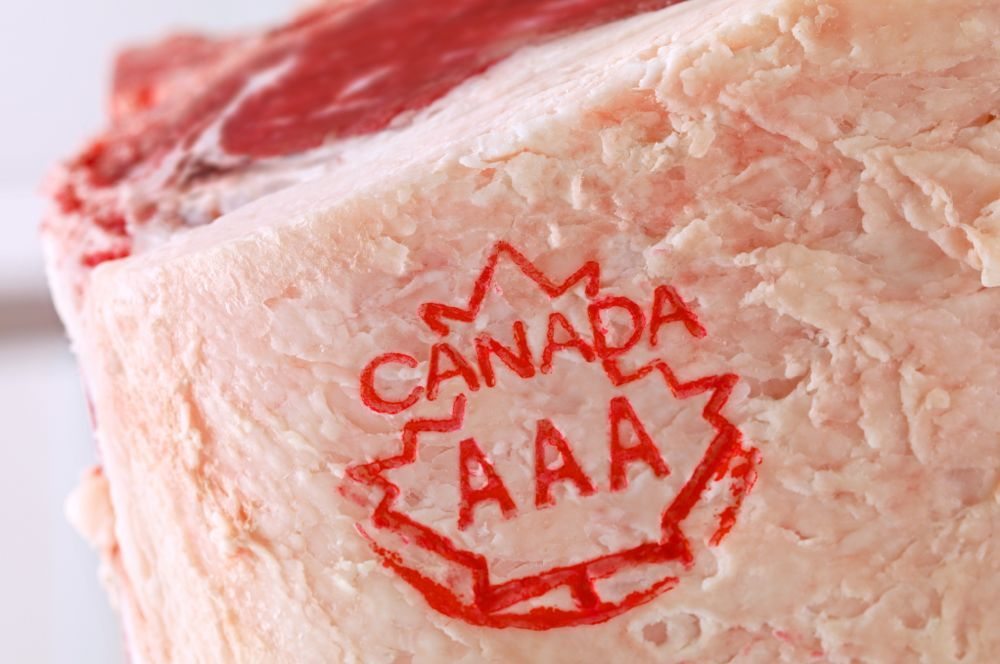Clock ticking to avoid North American food fight
Funding bill, including COOL repeal, en route through Congress
By Rod Nickel
| 4 min read

(Photo courtesy Canada Beef Inc.)
Winnipeg | Reuters –– The North American spat pitting Canada and Mexico against the U.S. over meat labels has sown confusion among producers and shippers in all three countries, with a trade war potentially just weeks away.
The World Trade Organization on Monday authorized Canada and Mexico, the biggest markets for exported U.S. goods, to retaliate against the United States’ country-of-origin labelling (COOL) rules on meat, setting the annual tariff level at C$1.055 billion for Canada and US$228 million for Mexico.
However, the U.S. took a step toward defusing the row on Wednesday when the U.S. Congress approved a spending bill that includes the repeal of federal laws mandating meatpackers identify where animals are raised and slaughtered.
“It’s causing a lot of angst and anxiety,” said Candace Sider, vice-president of Canadian regulatory affairs for customs brokerage and trade consultant Livingston International.
A trade war may force importers in Canada and Mexico to find alternative suppliers, Sider said — but the biggest unknown element is which products may be affected.
The U.S. in 2014 shipped goods worth $312 billion to Canada and $240 billion to Mexico, according to U.S. Department of Commerce.
Canada’s previous Conservative government listed in 2013 three dozen U.S. product categories that could be subject to a 100 per cent surtax, including pork, beef, cherries, appliance parts, chocolate, wine and office furniture.
The new Liberal government has not clarified which products it may target.
The COOL dispute stems from a 2009 U.S. requirement that retail outlets label food with information about its origin. Canada and Mexico argued that COOL led to fewer of their cattle and pigs being slaughtered in the U.S.
“Why our industry? This is (about) beef and pork,” said Wayne Morris, a vice-president with the Association of Home Appliance Manufacturers, whose members include General Electric. “It’s a bit unfair.”
Oregon winemaker A to Z Wineworks, which sells to both Canada and Mexico, is likely to focus sales next year on offshore markets a little more than usual, given the uncertainty around Canada, said founder Sam Tannahill.
Canada remains a key market, he said.
Trade retaliation may also inadvertently hurt Canadian importers.
An official at a Canadian company that imports U.S. meat to sell to processors, including Cargill and Maple Leaf Foods, said it would have to find supplies domestically if Canada strikes back. The official was not authorized to comment publicly.
If Canada’s final tariff list includes pork, in a North American market where U.S. packers are already slaughtering at capacity, “unfortunately it probably will have negative implications” for Canadian hog farmers, said Perry Mohr of marketing agency H@ms Marketing Services.
The best-case scenario for all, he said, is if the U.S. Congress repeals COOL before any tariffs are imposed.
“Right now we’ve seen U.S. processors killing at capacity,” Mohr said Friday on the Prairie hog industry program Farmscape, and “we know, based on past experience, that they have to export about 25 per cent of what they produce in order to clear the market.”
If U.S. pork starts backing up into the U.S. behind a Canadian tariff wall, he said, “it will in effect lower U.S. hog prices — which will in effect lower Canadian hog prices, because we use those U.S. markets as our pricing point.”
Mexico may target U.S. apples, dairy, alcohol and personal hygiene products.
“It will have an import cost and obviously the final price of the product will go up,” said Arturo Behr, president of the Mexican association of importers and exporters.
The association supports retaliatory measures, despite the impact on importers, because it protects Mexican exports, Behr said.
A trade war could even affect internal supply chains. A company that ships products from the U.S. to Canada for further manufacturing could face the surtax, Sider said.
COOL has already added costs throughout North America’s beef supply chain, said Cargill vice-president of corporate affairs Chantelle Donahue.
“We believe this mandatory labeling law must be repealed before any damaging tariffs are implemented,” said Gary Mickelson, spokesman for U.S. beef packer Tyson Foods.
To be sure, in only six of the previous 18 cases in which the WTO has authorized sanctions did countries actually apply them, since most cases were settled first.
If Canada and Mexico slap surtaxes on U.S. products, shoppers in those countries will pay more, said Bruce Cran, president of Consumers’ Association of Canada.
“It would be a disaster. We’ll be in a trade war, and consumers are always called upon to pay the penalty.”
U.S. Senator Pat Roberts, chair of the Senate agriculture committee, hailed the omnibus bill in a release Wednesday, adding he hoped the Senate “can pass this legislation in time to avoid devastating tariffs.”
If the repeal passes, he said, U.S. farmers, ranchers and small businesses “will finally get the certainty they deserve from unnecessary trade retaliation.”
— Rod Nickel is a Reuters correspondent covering the agriculture and mining sectors from Winnipeg. Additional reporting for Reuters by Joanna Bernstein in Mexico City. Includes files from AGCanada.com Network staff.


